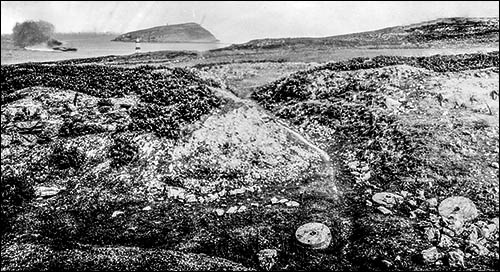Pilots’ cottages, Trwyn Du, Penmon
The scene here at Trwyn Du (Black Point) was shaped when shipwrecks were common. Offshore stands the lighthouse, which began to operate in 1837. Near the road and Wales Coast Path stands a pair of white houses (just down the slope from the Pilot House Cafe) which were built in the late 1830s as accommodation for the Penmon pilots, who guided ships through local waters.
 The lighthouse and cottages were built after the wreck of the Rothsay Castle, built in 1816 for the relatively sheltered waters of the Clyde. The steamer was in poor condition when it left Liverpool for Beaumaris on 18 August 1831. As it struggled through a storm along the North Wales coast, the drunken captain rejected a plea from William Tarrey, on behalf of fellow passengers, to find a safe anchorage.
The lighthouse and cottages were built after the wreck of the Rothsay Castle, built in 1816 for the relatively sheltered waters of the Clyde. The steamer was in poor condition when it left Liverpool for Beaumaris on 18 August 1831. As it struggled through a storm along the North Wales coast, the drunken captain rejected a plea from William Tarrey, on behalf of fellow passengers, to find a safe anchorage.
The ship had almost reached journey’s end when it ran aground on Dutchman’s Bank, a sandbank south of Puffin Island. Only 23 people survived the wreck, and almost 130 died. William’s wife Alice was buried on the Great Orme. Some of the ship’s timbers were used for the Castle Hotel in Llanfairfechan.
 Penmon lifeboat station, near Trwyn Du, was established after the wreck, but the pilots used their own boat when there was no time to muster the lifeboat crew. In 1866, for example, their prompt action saved all six crew of the Beryl of Aberystwyth which was on the verge of breaking up on Perch Rock (between Trwyn Du and Puffin Island).
Penmon lifeboat station, near Trwyn Du, was established after the wreck, but the pilots used their own boat when there was no time to muster the lifeboat crew. In 1866, for example, their prompt action saved all six crew of the Beryl of Aberystwyth which was on the verge of breaking up on Perch Rock (between Trwyn Du and Puffin Island).
The pilots’ job was to board ships to help captains navigate the difficult waters between Trwyn Du and Menai Bridge. This was a compulsory pilotage, under 1854 legislation. Such pilotages were intended for warships but were supported by fees from commercial shipping.
 By the early 20th century there were complaints that passenger ships serving all three piers in the Menai Strait had to pay three pilot fees and take on three different pilots, one per pilotage. Critics argued the service was unnecessary because modern captains were well paid and competent.
By the early 20th century there were complaints that passenger ships serving all three piers in the Menai Strait had to pay three pilot fees and take on three different pilots, one per pilotage. Critics argued the service was unnecessary because modern captains were well paid and competent.
William Pritchard, a Penmon pilot and lifeboat cox, lost his son Henry Pritchard in the First World War. Henry died in France, aged 28, in April 1918 and is commemorated on Llangoed war memorial.
The lowest photo shows a millstone quarry at Penmon c.1902. See the footnotes for details of millstone production here.
Postcode: LL58 8RP View Location Map
Footnotes: Millstone quarrying at Penmon
In Anglesey’s carboniferous limestone sequence there are intermittent beds of sandstone conglomerates which have infilled channels and pipes within the limestone, writes Michael Statham. These beds were used for millstones. In 1615 Sir Richard Bulkeley complained of trespass “in taking millstone from Penmon, Anglesey”. Surveyor Lewis Morris stated in 1748: “At Penmon and in that Neighbourhood there are several Quarries of Millstones, of the Grit Kind, of which great Quantities are shipped off there.”

